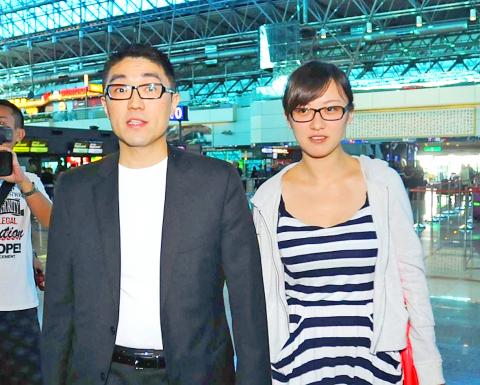Chinese Nationalist Party (KMT) Legislator Hsieh Kuo-liang (謝國樑) turned down a nomination offer from the party and President Ma Ying-jeou (馬英九), who doubles as KMT chairman, to run in Keelung’s mayoral election, citing objections from his family.
The KMT has been looking for a replacement for Keelung City Council Speaker Huang Ching-tai (黃景泰), whose nomination was withdrawn by the party on Wednesday in relation to corruption allegations and tanking public support.
Hsieh was at the top of the party’s replacement list.

Photo: CNA
The legislator has been asserting his unwillingness to run for office and formally rejected the offer after meeting the president on Thursday night.
“My family and my parents are all against the idea. So I have to say sorry to President Ma. However, I will certainly do my job for the party’s election campaign in Keelung,” he said at Taipei Taoyuan International Airport yesterday.
The legislator left the nation yesterday morning for a 10-day trip to Europe.
In a telephone interview with News 98 radio show host Clara Chou (周玉蔻) prior to his departure, Hsieh was asked whether his relationship with the party would be at risk if he refused the nomination, which could negatively affect his nomination next year for legislator.
The three-term legislator said he “does not view [the legislator nomination] that seriously,” adding that if he has the chance, he would continue to serve as a representative, but if not, “I would be OK with changing my career, too.”
Reportedly, Hsieh’s family background figured in the KMT’s decisionmaking process for replacing Huang.
The Hsiehs, who own the Sangong Group (三功集團) and local businesses such as the Second Credit Cooperative of Keelung and educational institutions such as Keelung ErXin High School, are a prominent family in the city.
Both Hsieh’s father and grandfather were Keelung councilors and provincial councilors — during the time when the Taiwan Provincial Government was still functioning — and his grandfather had once run for mayor.

Alain Robert, known as the "French Spider-Man," praised Alex Honnold as exceptionally well-prepared after the US climber completed a free solo ascent of Taipei 101 yesterday. Robert said Honnold's ascent of the 508m-tall skyscraper in just more than one-and-a-half hours without using safety ropes or equipment was a remarkable achievement. "This is my life," he said in an interview conducted in French, adding that he liked the feeling of being "on the edge of danger." The 63-year-old Frenchman climbed Taipei 101 using ropes in December 2004, taking about four hours to reach the top. On a one-to-10 scale of difficulty, Robert said Taipei 101

Nipah virus infection is to be officially listed as a category 5 notifiable infectious disease in Taiwan in March, while clinical treatment guidelines are being formulated, the Centers for Disease Control (CDC) said yesterday. With Nipah infections being reported in other countries and considering its relatively high fatality rate, the centers on Jan. 16 announced that it would be listed as a notifiable infectious disease to bolster the nation’s systematic early warning system and increase public awareness, the CDC said. Bangladesh reported four fatal cases last year in separate districts, with three linked to raw date palm sap consumption, CDC Epidemic Intelligence

Taiwanese and US defense groups are collaborating to introduce deployable, semi-autonomous manufacturing systems for drones and components in a boost to the nation’s supply chain resilience. Taiwan’s G-Tech Optroelectronics Corp subsidiary GTOC and the US’ Aerkomm Inc on Friday announced an agreement with fellow US-based Firestorm Lab to adopt the latter’s xCell, a technology featuring 3D printers fitted in 6.1m container units. The systems enable aerial platforms and parts to be produced in high volumes from dispersed nodes capable of rapid redeployment, to minimize the risk of enemy strikes and to meet field requirements, they said. Firestorm chief technology officer Ian Muceus said

MORE FALL: An investigation into one of Xi’s key cronies, part of a broader ‘anti-corruption’ drive, indicates that he might have a deep distrust in the military, an expert said China’s latest military purge underscores systemic risks in its shift from collective leadership to sole rule under Chinese President Xi Jinping (習近平), and could disrupt its chain of command and military capabilities, a national security official said yesterday. If decisionmaking within the Chinese Communist Party has become “irrational” under one-man rule, the Taiwan Strait and the regional situation must be approached with extreme caution, given unforeseen risks, they added. The anonymous official made the remarks as China’s Central Military Commission Vice Chairman Zhang Youxia (張又俠) and Joint Staff Department Chief of Staff Liu Zhenli (劉振立) were reportedly being investigated for suspected “serious